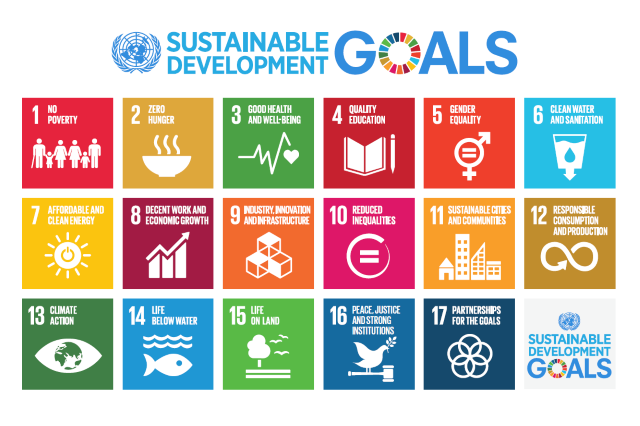The Sustainable Development Goals were adopted during the United Nations summit for the adoption of the post-2015 development agenda in New York on 25 September 2015.
After two years of negotiations the Sustainable Development Goals (SDGs), adopted by world leaders on Friday 25th September, are the most ambitious development framework ever conceived. They are grounded in recognition of the dignity of the human person and they endeavour to reach the furthest behind first.
Unlike their predecessors, the Millennium Development Goals (MDGs), which focused on challenges in developing countries, the SDGs are for all nations. The 17 goals and 169 targets apply to all countries and are designed to address global inequalities while sustaining people within planetary boundaries.
To date, no country has developed sustainably or equitably; the current fossil-fuel dependent model of development has not realised gender equality, education for all or equitable economic growth. In fact the OECD reports that the gap between rich and poor is at its highest level in 30 years [1]. With their targets and indicators the SDGs offer an alternative global development pathway, powered by low-carbon technologies and grounded in the principles of justice, transparency and equity.
Goal 13 “Take urgent action to combat climate change and its impacts” is of particular note, because without climate action, there can be no development gains. Tackling climate change requires us to take action in areas covered by other goals such as clean energy, sustainable agriculture and responsible consumption and production. These SDGs are interconnected – one cannot be achieved without the other. Their successful achievement requires a unified effort, across sectors and disciplines to reach all corners of the world. Innovative partnerships between people, business, philanthropists, civil society and governments will be critical to achieve the goals.
From January 2016 countries at all levels of development will develop their national plans to achieve the SDGs. This will be the moment to depart from business as usual and embrace a new model of development that leaves fossil fuels in the ground, scales up renewable energy, upholds human rights and achieves equality. This is a challenge for all countries, but even more so for developing countries as they strive to achieve their development aspirations without the fossil fuels that industrialised countries took for granted. Developing countries need and deserve our solidarity – developed countries must lead and support others to achieve the shared goals.
Putting the SDGs into action reminds us of our inter-dependence. Each country has expertise related to the 17 goals to share, just as each country needs the actions of others to achieve the goals. In this, I am reminded of an Irish proverb Is ar scáth a chele a mhaireann na daoine (it is in each other’s shadow that we flourish). We have 15 years to flourish and to take the climate justice approach needed to ensure that our legacy to future generations is a world that is safe, that upholds human dignity and that protects the earth’s resources for all.
ENDS
[1] Ref Cingano, F. (2014), “Trends in Income Inequality and its Impact on Economic Growth”, OECD Social, Employment and Migration Working Papers, No. 163, OECD Publishing. http://dx.doi.org/10.1787/5jxrjncwxv6j-en


